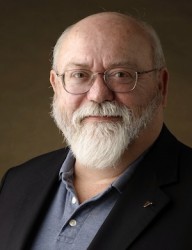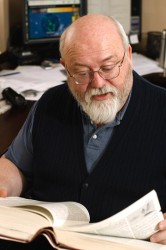
David F. Salisbury, senior research writer in Vanderbilt’s Office of News and Communications, has been named a fellow of the American Association for the Advancement of Science (AAAS) for his achievements in communicating and interpreting science to the public. Salisbury is Vanderbilt’s first science communicator to be so honored; he joins 17 researchers at Vanderbilt University Medical Center this year. This year 388 members have been named fellows by AAAS because of their scientifically or socially distinguished efforts to advance science or its applications.
“We are proud that the AAAS has chosen to honor David’s work,” said Elizabeth Latt, assistant vice chancellor for News and Communications. “For decades, he has effectively communicated to a nonscientific audience the wonder and relevance of the work of scientists and engineers in an academic setting. He has done so while honoring the integrity of the scientific process and its outcomes. We are truly fortunate to have him on our team.”
A physics major at the University of Washington, Salisbury was inspired by his college creative writing courses to pursue a career in journalism instead. He began as a “copy kid” at the Christian Science Monitor in 1972, but quickly moved up to the science and technology desk. “They decided to put me in the slot on a trial basis,” Salisbury said. “It was definitely a sink-or-swim experience. Fortunately, I managed to keep my head above water. As a result, [rquote]I became one of the very few science journalists at the time who had a science degree.”[/rquote]
At the Monitor, he covered a number of the biggest science and technology stories of the time, including Skylab, the Pioneer, Voyager and Viking probe missions and the Three Mile Island disaster. His reporting garnered several national awards, including the National Association of Science Writer’s Science-in-Society Award, which is given by peers and considered one of the highest honors in science communications.

After 13 years at the Monitor, Salisbury transitioned into university PR as a research writer for the University of California-Santa Barbara and then Stanford University. While at Stanford, Salisbury and his colleague Dennis Meredith conceived the idea of an online bulletin board—this was the pre-World Wide Web days of the early 1990’s—that could serve as a one-stop online repository of university science and technology news. This eventually became the AAAS’ news service, Eurekalert!, now a household name for science journalists.
Salisbury’s interest in creating original online journalism brought him to Vanderbilt in 1999, where he became the “chief cook and bottle washer” of Exploration, the country’s first online-only university research magazine. The dynamic possibilities of online multimedia make the internet “the perfect medium for telling stories about science,” Salisbury said.
In 2010, Exploration became the foundation of Vanderbilt’s online research channel, Research News @ Vanderbilt. In addition to his ongoing contributions to the research site, Salisbury provides communications support for the science and technology departments in the College of Arts and Science and School of Engineering.
Salisbury will join this year’s fellows in Chicago at the 2014 AAAS Annual Meeting in Chicago to receive his official certificate and rosette pin on Feb. 15, 2014.